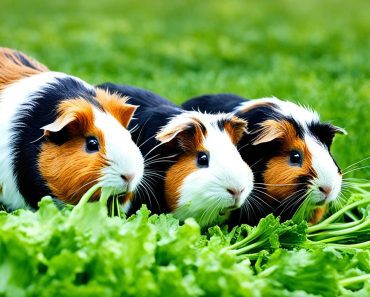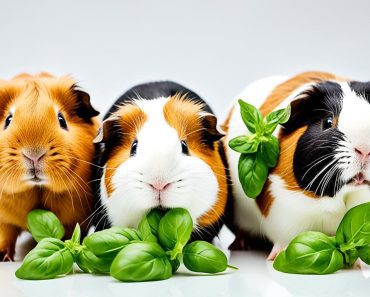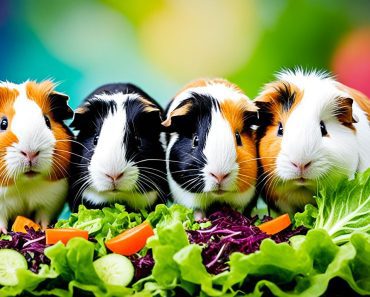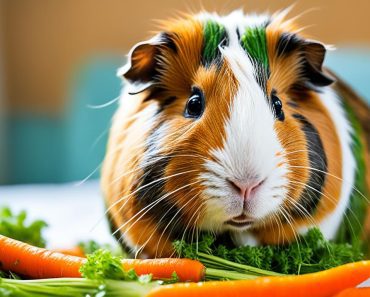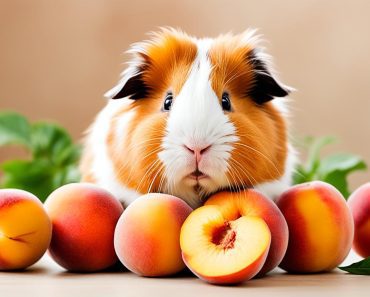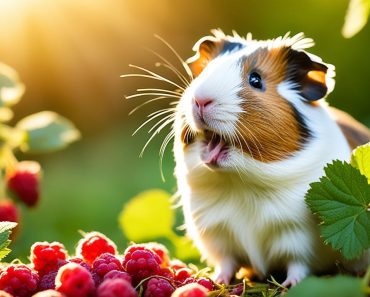Guinea pigs are delightful pets known for their adorable squeaks and fluffy coats. As a responsible guinea pig owner, I constantly strive to provide the best care for my furry friend, including a healthy and balanced diet. Recently, I came across a common question among guinea pig owners: Can guinea pigs eat bananas? Naturally curious, I embarked on a quest to uncover the truth and share my findings with fellow guinea pig enthusiasts.
Before diving into the question, it’s essential to understand the basics of a guinea pig’s diet. Their food preferences range from grass and hay to fresh greens and occasional fruits. However, not all foods are safe for our little friends. Let’s explore the nutritional aspects of feeding bananas to guinea pigs and the importance of a well-rounded diet.
Can Guinea Pigs Eat Bananas? Yes, they can, once in a while.
- Guinea pigs can eat bananas as an occasional treat.
- However, bananas should be given in moderation due to their high sugar content.
- Guinea pigs with kidney issues should not be fed bananas.
- A guinea pig’s diet should primarily consist of hay, grass, guinea pig nuggets, and fresh water.
- Fresh greens and safe fruits can provide additional nutrients and variety when fed in moderation.
The Importance of Hay and Grass in a Guinea Pig’s Diet
When it comes to a guinea pig’s diet, hay and grass play a vital role, comprising approximately 85-90% of their daily food intake. These sources provide the necessary fiber and nutrients needed for your guinea pig’s delicate digestive system and overall health.
Feeding them unlimited amounts of high-quality feeding hay or fresh grass has numerous benefits, including maintaining a healthy digestion and promoting dental health. Hay should be carefully selected, ensuring it has high nutritional value and is specially grown for small pets.
Benefits of Hay and Grass:
- Promotes healthy digestion
- Aids in maintaining dental health
- Provides essential fiber for proper gut function
- Helps prevent common health issues like diarrhea and constipation
Guinea pigs should have access to at least their own body size in fresh feeding hay every day, which ensures they have an ample supply and can continuously graze to meet their dietary needs. The constant chewing and grinding on hay also help keep their teeth properly worn down.
| Type of Hay | Nutritional Benefits |
|---|---|
| Timothy Hay | High-fiber content, low in calcium |
| Orchard Grass Hay | High-quality hay, packed with nutrients |
| Alfalfa Hay | High in protein, calcium, and calories (should be fed in limited amounts to adult guinea pigs) |
It’s important to note that hay should be the main source of forage, while grass can be a supplement or alternative when fresh hay is not available. Whether you choose feeding hay or grass, ensure it’s fresh and free from mold or dust to prevent respiratory issues in your guinea pig.
Feeding hay and grass to your guinea pig not only meets their nutritional needs but also satisfies their natural instinct to chew and graze. So, make sure to provide them with an abundant supply of high-quality hay or fresh grass every day.
The Role of Guinea Pig Nuggets and Fresh Water
When it comes to the nutrition of your guinea pig, it’s important to ensure they are receiving a balanced diet. Along with hay and fresh greens, guinea pig nuggets play a crucial role in providing essential vitamins and minerals.
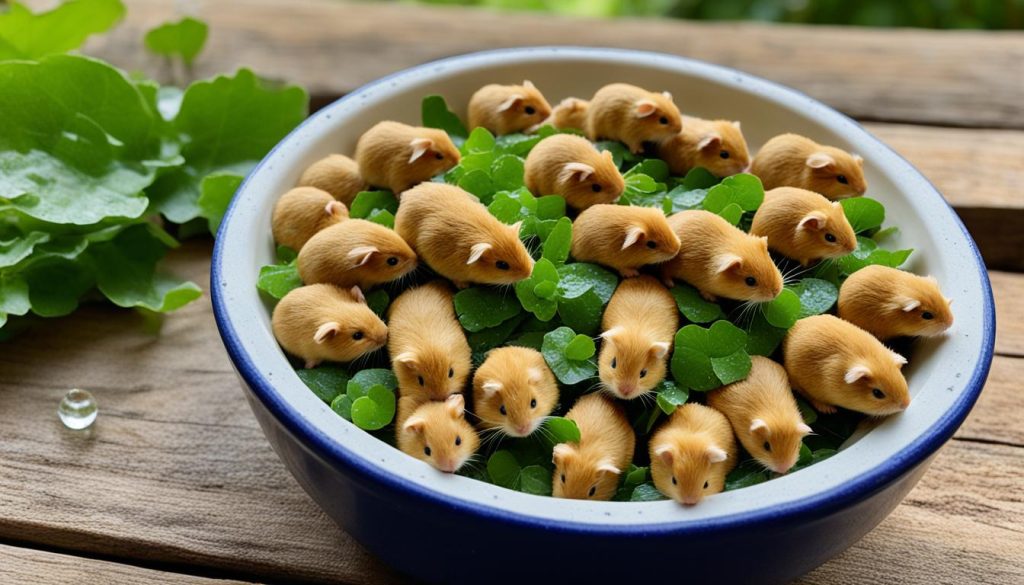
Guinea Pig Nuggets: A Nutritious Addition
A small portion of guinea pig nuggets, approximately 5% of their daily diet, should be included to provide the right balance of nutrients. These nuggets are formulated to meet the specific dietary needs of guinea pigs, containing essential fiber, vitamins, and minerals.
Important note: It’s essential to choose guinea pig nuggets that are high in beneficial fiber and specifically formulated for guinea pigs. Avoid muesli mixes, as they can lead to selective feeding, where guinea pigs pick out the tastier components and ignore the rest, resulting in an imbalanced diet.
Providing Fresh Water
Along with guinea pig nuggets, fresh water is a crucial component of their daily diet. It should be provided constantly in a clean and accessible manner.
Tip: Use a special pet bottle with a solid sipper tube and ball bearing designed for guinea pigs to drink from. This helps ensure that the water remains clean and uncontaminated.
| Guinea Pig Nugget Benefits | Recommended Daily Intake (5% of their diet) |
|---|---|
| Provides essential vitamins and minerals | Approximately 1 tablespoon |
| High in beneficial fiber | |
| Specifically formulated for guinea pigs |
By incorporating guinea pig nuggets into their diet and ensuring they have access to fresh water, you are taking important steps to support their overall health and well-being.
Safe Greens and Vegetables for Guinea Pigs
Guinea pigs can benefit from incorporating fresh greens into their diet, as they are a good source of vitamin C and provide additional nutrients. When choosing which greens and vegetables to feed your guinea pigs, it’s important to make safe and nutritious choices. Here are some options that are considered safe for guinea pig nutrition:
- Parsley: A leafy green herb that is rich in vitamin C and provides fiber for healthy digestion.
- Dandelion leaves: These leaves are safe for guinea pigs and can provide essential vitamins and minerals.
- Kale: A nutrient-packed green that is high in vitamin C and other beneficial compounds.
- Broccoli: This vegetable is a good source of fiber and contains important nutrients such as vitamin C.
- Bell peppers: These vibrant vegetables are packed with vitamin C and are safe for guinea pigs to enjoy.
- Lettuce: A leafy green that can provide variety in a guinea pig’s diet, but should be fed in moderation due to its lower nutritional value.
In addition to greens, guinea pigs can also enjoy safe herbs such as basil, coriander, mint, and oregano. These herbs can add flavor and variety to their diet while providing additional nutrients.
However, it’s important to note that some vegetables should be fed in moderation. These include asparagus, Brussels sprouts, cabbage, cucumber, and spinach. While these vegetables can be included in their diet, excessive consumption may lead to digestive issues.
Overall, providing a balanced and varied diet that includes safe greens and vegetables can contribute to the overall health and well-being of guinea pigs.
| Safe Greens and Vegetables for Guinea Pigs | Benefits | Considerations |
|---|---|---|
| Parsley | Rich in vitamin C and provides fiber | Feed in moderation to avoid digestive issues |
| Dandelion leaves | Provides essential vitamins and minerals | Ensure they come from a pesticide-free source |
| Kale | High in vitamin C and other beneficial compounds | Avoid feeding excessive amounts to prevent bladder stones |
| Broccoli | Good source of fiber and contains important nutrients | Feed in moderation due to its gas-inducing properties |
| Bell peppers | Packed with vitamin C and safe for guinea pigs | Remove seeds and feed in moderation |
| Lettuce | Provides variety but lower in nutritional value | Feed in moderation due to its high water content |
Guinea Pig Safe Fruits and Occasional Treats
When it comes to treating your guinea pig to something special, safe fruits can be a delicious and nutritious option. Adding variety to their diet can keep them excited and satisfied. Here are some safe fruits that you can offer your guinea pig as occasional treats:
- Apple
- Pear
- Plum
- Strawberry
- Blueberry
- Melon
These fruits provide essential vitamins and minerals that support your guinea pig’s overall health. However, it’s important to remember that fruits contain natural sugars, so they should be given in small amounts to prevent any negative impact on their health.
While bananas can also be included in their treat repertoire, they should be offered in moderation due to their high sugar and fiber content. A small slice or smushed banana can be given as a special indulgence.
Note: Remember to avoid feeding your guinea pigs with human food, chocolate, dairy products, and citrus fruits, as these can be harmful to their health.
It’s essential to prioritize your guinea pig’s nutritional needs by primarily focusing on hay, grass, guinea pig nuggets, and fresh water as the main components of their diet. Safe fruits should only be provided as occasional treats to maintain a balanced and nutritious feeding routine.
To help you visualize the nutritional content of these safe fruits for guinea pigs, here’s a table detailing their key characteristics:
| Fruit | Vitamin C (mg) | Potassium (mg) | Sugar (g) |
|---|---|---|---|
| Apple | 0.5 | 107 | 9.5 |
| Pear | 0.6 | 116 | 9.8 |
| Plum | 0.1 | 157 | 9.9 |
| Strawberry | 55 | 153 | 4.9 |
| Blueberry | 9.7 | 77 | 14.5 |
| Melon | 33 | 267 | 7.6 |
The table above showcases the vitamin C, potassium, and sugar content of each fruit. This information can help you make informed decisions about serving sizes and ensure that your guinea pig’s treats align with their nutritional needs.
By offering safe fruits as occasional treats, you can add variety to your guinea pig’s diet while promoting their overall health and well-being.
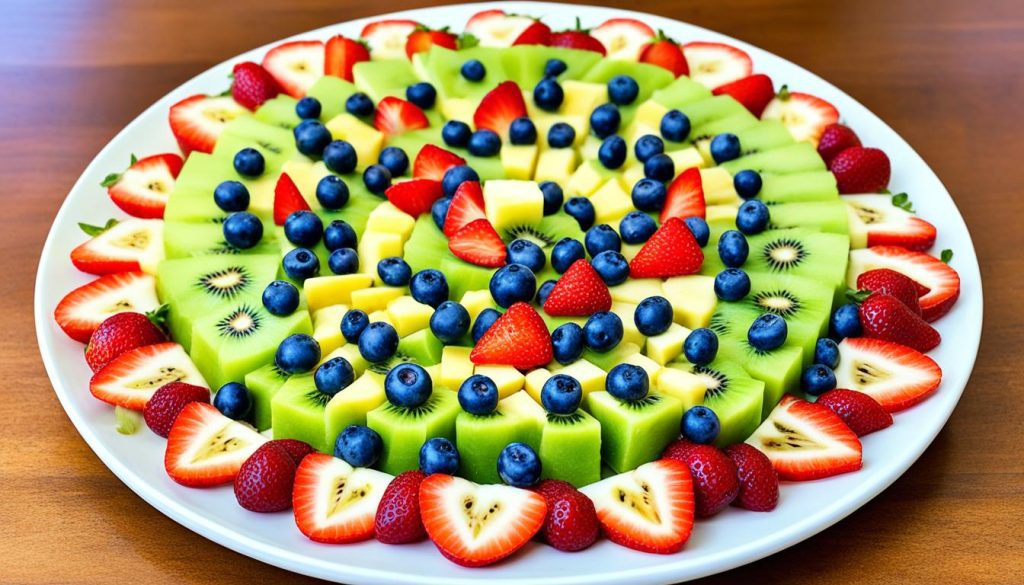
Advantages and Disadvantages of Feeding Bananas to Guinea Pigs
When it comes to treating our guinea pigs, bananas can be a delightful option. Not only do they add variety to their diet, but they also provide important nutrients for their overall well-being. Let’s take a closer look at the advantages and disadvantages of feeding bananas to guinea pigs.
The Advantages of Feeding Bananas to Guinea Pigs
1. Rich in potassium: Bananas contain a significant amount of potassium, which plays a crucial role in proper organ function and maintaining healthy blood pressure levels.
2. Source of vitamin C: Guinea pigs, just like humans, cannot produce their own vitamin C and must obtain it from their diet. Bananas contain vitamin C, which supports their immune system and promotes overall health.
3. Delicious and enjoyable: Guinea pigs relish the sweet taste of bananas, making them a tasty and much-loved treat. It can also serve as an excellent way to bond with your furry friend.
The Disadvantages of Feeding Bananas to Guinea Pigs
1. High sugar content: While bananas offer nutritional benefits, they are also high in sugar. Feeding guinea pigs too many bananas can lead to weight gain, obesity, and potential dental problems.
2. Not suitable for guinea pigs with kidney issues: Guinea pigs with kidney problems may struggle to process the excess potassium found in bananas. It’s crucial to consult a veterinarian before including bananas in the diet of a guinea pig with renal concerns.
Feeding Bananas Responsibly
When offering bananas as a treat, moderation is key. Remember to slice or smush the banana into small portions to prevent choking hazards, and offer no more than 10-15 grams of banana per week to avoid potential health issues. It’s always wise to consult a veterinarian before making any significant changes to your guinea pig’s diet.
“I love treating my guinea pigs to small pieces of banana as an occasional snack. They enjoy the taste, and I know they’re getting some extra nutrients. However, I always make sure to limit the amount and seek advice from my vet to ensure their health and well-being.”
Ultimately, while bananas can be a healthy treat for guinea pigs when given in moderation, it’s essential to provide a balanced diet that includes hay, guinea pig nuggets, fresh water, and other nutritious foods. By catering to their dietary needs and treating them responsibly, we can ensure that our guinea pigs lead healthy and happy lives.
Appropriate Serving Size and Preparations for Bananas
When it comes to feeding guinea pigs bananas, it’s crucial to be mindful of the serving size and preparations. Here are some important considerations:
- Start small: When introducing bananas to your guinea pig’s diet, it’s always best to start with a very small amount. This allows you to observe their reaction and ensure they tolerate it well. Some guinea pigs may have sensitive stomachs and may not react positively to bananas.
- Slice or smush: If your guinea pig enjoys bananas and tolerates them well, you can provide a small slice or smushed banana as a sweet treat. Remember to remove any seeds and cut it into appropriate bite-sized pieces.
- Moderation is key: Due to the high sugar content in bananas, it’s important to limit the amount you feed your guinea pig. It’s recommended to offer no more than 10-15 grams of banana per week to prevent negative health effects.
- Dried bananas: Dried bananas can be given as special treats, but in very small amounts. They should not replace fresh bananas in your guinea pig’s diet, as they are typically higher in sugar and may be more difficult to digest.
- Portion control: It’s important to remember that bananas should be given in moderation due to their high sugar and fiber content. Overfeeding bananas can potentially lead to weight gain, upset stomach, and other health issues. Always consult a veterinarian for guidance on portion sizes for your guinea pig.
Conclusion
After considering the nutritional needs and dietary requirements of guinea pigs, it is clear that bananas can be included as an occasional treat in their diet. However, it is crucial to feed them in moderation due to their high sugar content. The majority of a guinea pig’s diet should consist of hay, grass, guinea pig nuggets, and fresh water. These provide the necessary fiber, vitamins, and minerals for their overall health and well-being.
When incorporating fresh greens and safe fruits into a guinea pig’s diet, it is important to remember that they should be given in moderation. These foods can provide additional nutrients and variety, but overfeeding can lead to digestive issues. It is equally important to avoid feeding guinea pigs with human food, chocolate, dairy products, and citrus fruits, as these can be harmful to their health.
To ensure the best diet for your guinea pig, it is always advisable to consult a veterinarian for guidance. They can provide expert advice tailored to your guinea pig’s specific needs. By providing a balanced and nutritious diet, along with regular veterinary care, you can ensure that your guinea pig enjoys a healthy and happy life.

